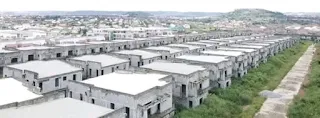In a revelation that underscores the depth of corruption in Nigeria, the Economic and Financial Crimes Commission (EFCC) recently disclosed that 753 duplexes have been seized from a single former public official. Yes, 753 properties, all acquired through the theft of public funds meant to serve millions. This shocking figure is a glaring testament to the unchecked greed and impunity that have eroded the very foundations of governance and development in Nigeria.
And this is merely the tip of the iceberg. For every thief caught or exposed, there are thousands more who remain in the shadows. These looters have siphoned billions of naira and foreign currencies to build empires of stolen wealth, both within Nigeria and abroad. From Abuja to Dubai, Lagos to London, and Port Harcourt to Paris, the map of Nigerian corruption is global. Their ill-gotten gains fund luxurious lifestyles, private jets, opulent mansions, and offshore accounts, while the people they were supposed to serve are left with crumbling infrastructure, failing systems, and unending hardship.
High-profile names like Diezani Alison-Madueke, who allegedly misappropriated billions of dollars during her tenure as a minister, or Emefi-Ole (a scornful rebranding of a disgraced former official), stand as stark symbols of this decay. These individuals have been accused of buying properties in some of the world's most expensive cities—London, New York, Dubai, and Paris—while Nigerians struggle to afford basic needs. For every mansion bought overseas with stolen funds, there’s a hospital in Nigeria left without equipment, a school without books, or a road that remains impassable.
A Country Brought to Its Knees
The result of this grand-scale looting is a nation in despair. Nigeria, once heralded as the "Giant of Africa," now bears the scars of systemic corruption. Its people face daily struggles with inflation, unemployment, insecurity, and a deteriorating standard of living. Basic amenities like electricity, potable water, and healthcare remain a luxury for many. Yet, those entrusted to serve the public continue to enrich themselves at the nation’s expense.
The suffering of Nigerians today is not an accident; it is the direct result of decades of theft, mismanagement, and misplaced priorities. Corruption has eaten so deeply into the fabric of the nation that it now seems normalized. The thieves who pillage the national treasury are not only unrepentant but are often celebrated in some quarters, turning the concept of justice on its head.
A Call to Action
What is even more disheartening is the lack of accountability. While a few are caught and paraded in the media, the majority escape justice, thanks to weak institutions, compromised systems, and a society that too often looks the other way. Without a firm commitment to transparency, accountability, and the rule of law, Nigeria will remain stuck in this vicious cycle of poverty amidst plenty.
The question is, how long can this continue? How long will Nigerians watch as their country’s wealth is stolen and flaunted while they languish in poverty? The time for change is now. It requires not just the reform of institutions but a collective awakening—a refusal to accept corruption as normal and a demand for justice, equity, and fairness.
What a Country, Indeed
This is the tragic paradox of Nigeria: a nation endowed with immense natural and human resources, yet crippled by the greed of a few. While the wealthy minority builds empires of stolen wealth, the majority are left to suffer the consequences. What a country—where potential is limitless, but progress remains stunted by the actions of its own leaders.
Until the day comes when thieves are truly held accountable and the stolen wealth is returned to rebuild the nation, Nigeria’s story will remain a cautionary tale of squandered opportunities and unfulfilled promise.


Comments
Post a Comment